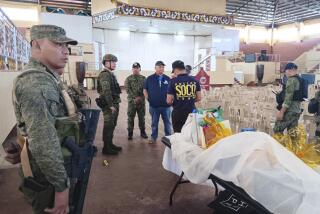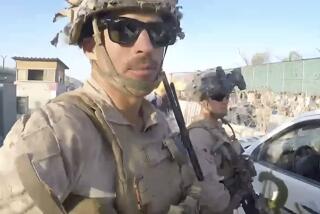Philippine Blast Kills at Least 16 People
- Share via
ZAMBOANGA CITY, Philippines — A bomb placed in a food stall near a crowded pier in Davao City exploded Wednesday, killing at least 16 people and injuring more than 40, authorities said.
The blast was so powerful that it decapitated some of its victims, witnesses said. Among those killed were two children and a nun who had just arrived from Manila.
The bomb went off about 7 p.m. as passengers were disembarking from the Manila ferry and others were boarding for the return trip, but it was unclear whether the vessel was the intended target. Police said heavy security at the wharf may have caused the attacker to leave the bomb outside the pier gate.
The blast occurred less than a month after a similar bomb killed 21 people, including an American missionary, outside the Davao City airport’s passenger terminal. Until then, the country’s second-largest city had largely been spared the fighting that has swept through the southern Philippines.
Authorities said it was too early to determine who placed the bomb at the pier, and no one claimed responsibility. Earlier in the day, however, a leader of the Abu Sayyaf rebel group had warned a radio station of coming attacks to retaliate for U.S. support of government forces fighting Islamic rebels in the southern Philippines. The warning was not broadcast until after the bombing.
“The U.S. has targeted the Muslims in the southern Philippines just like what they did in Palestine and Iraq and now here,” Abu Sayyaf leader Abu Solaiman told the Radio Mindanao Network in Manila by phone.
Solaiman is one of five leaders of the rebel gang wanted by the United States in the kidnapping and killing of two Americans -- California tourist Guillermo Sobero, who was beheaded in 2001, and Kansas missionary Martin Burnham, who was shot during a rescue attempt last year. Burnham’s wife, Gracia, was wounded but rescued during the shootout.
The United States sent special forces troops to the southern Philippines last year to train, advise and equip Philippine soldiers who are hunting down members of the gang, who cast themselves as Islamic militants but primarily engage in kidnapping for ransom. The Pentagon had announced that it would send combat troops this year to help hunt down the remaining Abu Sayyaf members, but the plan was shelved because of opposition from many Filipinos, who said it would violate a constitutional ban on foreign troops operating in the Philippines.
Abu Sayyaf has admitted responsibility for the March 4 airport bombing, but authorities blame a much larger rebel group, the Moro Islamic Liberation Front, which is fighting to create an independent Islamic state in the southern Philippines. Dozens of rebels and government soldiers have been killed in recent weeks as the fighting has escalated on Mindanao, the southern Philippines’ main island.
The Moro Islamic Liberation Front has denied responsibility for the airport blast and on Wednesday, even before it could be accused of the latest bombing, it condemned the wharf attack.
“This is a crime against humanity,” said Moro Islamic Liberation Front spokesman Eid Kabalu. “The attacker is a lunatic, a crazed man, killing innocent people. Politically, there is nothing to gain from this attack.”
Philippine President Gloria Macapagal Arroyo is scheduled to visit Davao City today, and officials said she had no plans to cancel her trip. Arroyo, who has been frustrated in her attempts to crack down on rebel groups, said she would order the military to crack down on “lawless elements and terrorists.”
*
Paddock reported from Jakarta, Indonesia, and special correspondent Jacinto reported from Zamboanga City.
More to Read
Sign up for Essential California
The most important California stories and recommendations in your inbox every morning.
You may occasionally receive promotional content from the Los Angeles Times.













